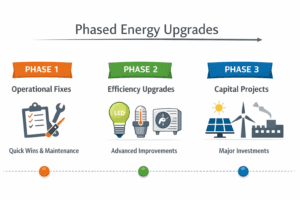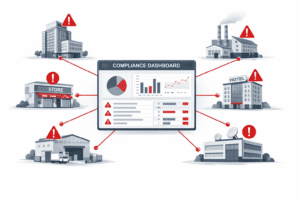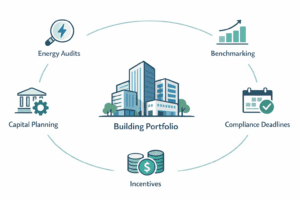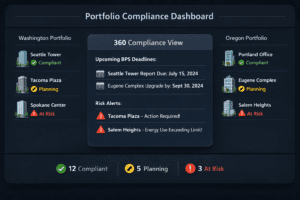Introduction
In the rapidly evolving landscape of the construction industry, the integration of sophisticated technologies has been a game changer. Today, construction technology not only propels the industry forward but also redefines the way structures are conceptualized, constructed, and monitored. However, this technological boon comes with significant challenges, particularly in the realm of data security. This blog explores the critical importance of data security in modern construction technology, highlighting why it’s imperative to protect digital assets to ensure industry success and reliability.
Section 1: The Rise of Digital Tools in Construction

The construction sector has seen a surge in the adoption of digital tools that enhance accuracy and efficiency. Prominent among these are Project Management Software, Building Information Modelling (BIM), drones, and Artificial Intelligence (AI). Each of these technologies plays a crucial role in modern construction projects:
– Project Management Software: Tools like Procore and Autodesk BIM 360 improve project coordination, track timelines, and manage resources, allowing for smoother project flows and enhanced communication among stakeholders.
– Building Information Modelling (BIM): BIM technology offers a digital representation of physical and functional characteristics of a facility. It is pivotal in architecture, engineering, and construction (AEC) for planning, designing, constructing, and managing buildings and infrastructure.
– Drones: Used for aerial photography, surveying land and ongoing construction sites, drones help collect vast amounts of data that are crucial for keeping projects on schedule and within budget.
– AI and Machine Learning: These technologies are used for various purposes, including predictive maintenance, optimizing schedules, and ensuring compliance with safety standards.
Each of these technologies generates massive data sets that are indispensable for the successful completion of construction projects. However, the storage, management, and analysis of this data present profound security challenges.
Section 2: The Importance of Data in Construction
Data in construction is invaluable. It underpins strategic decision-making, enhances operational efficiencies, and sharpens competitive edges. For instance, precise project plans and blueprints are crucial for maintaining design integrity and adherence to client specifications. Similarly, effective communication and accurate billing are essential for managing expectations and cash flows.
The reliance on digital data has exponentially increased the potential impact of data-driven decisions on project outcomes. As such, the security of this data directly influences not only the profitability of construction firms but also their reputational standing and compliance with increasingly stringent regulations.
Section 3: Data Security Risks in Construction Technology
As the volume of digital data in construction increases, so too does the risk of cyber threats. The construction industry, with its rich stores of confidential and valuable data, is an attractive target for cybercriminals. Data breaches can lead to significant financial losses through theft of intellectual property, ransomware attacks, or even sabotage.
For example, a cybersecurity incident in a large construction firm could result in the loss of sensitive data such as bid information, financial records, and personal employee data, leading to not just economic but also legal repercussions.
Section 4: The Necessity of Data Security in Construction Technology
Data security is paramount for several reasons:
– Business Continuity: A data breach can cause project delays, loss of customer trust, and ultimately, financial ruin.
– Reputation: In an industry where reputation can be a deal-maker or breaker, a company known for data mishandling can suffer significantly.
– Compliance: With regulations like the GDPR [General Data Protection Regulation] in Europe, and others worldwide, compliance is not just ethical but legal necessity.
Companies must adopt comprehensive cybersecurity strategies that include not only technological solutions but also organizational and cultural changes to enhance security.
Section 5: Implementing Strong Data Security Practices

Best practices in data security for construction technology include:
– Encryption: Protecting data at rest and in transit.
– Secure Back-ups: Ensuring data integrity through regular backups.
– System Updates: Keeping software up-to-date to protect against vulnerabilities.
– Employee Training: Equipping staff with the knowledge to recognize and prevent potential cyber threats.
A holistic approach to cybersecurity can significantly mitigate risks associated with digital data management in construction.
Section 6: The Role of Professionals and Experts in Ensuring Data Security
Given the specialized nature of cybersecurity, many construction firms now seek the expertise of cybersecurity professionals who can provide strategic insights and implement robust security protocols tailored to the unique needs of the construction industry.
Conclusion
As we’ve explored, the integration of technology in construction brings with it the critical need for robust data security measures. The future of construction will likely see even greater use of digital tools, making the need for effective data protection strategies more pressing than ever. Proactive data security is not just a technical requirement but a strategic imperative that underpins operational success and industry innovation in construction technology.
VertPro.com is the go-to hub for contractors dedicated to elevating energy performance upgrades for their clients. Our expansive suite of offerings includes expert Commercial Energy Audits, adept Benchmark Compliance consultation, and expansive Construction Marketplace. At VertPro®, we pride ourselves on delivering cutting-edge SaaS technology solutions that simplify the journey through Energy Benchmarking, and Energy Audits/RCx Plus, all while maintaining full compliance with a myriad of more than 60 Energy Benchmarking and Energy Efficiency Regulations nationwide.
At VertPro.com, we don’t just provide the insights and tools for energy management; we also bridge connections between qualified contractors and our client base, eager to upgrade their buildings. This creates a Marketplace where you can expand your project portfolio, ensuring that you’ll have more opportunities to apply your skills and grow your business.















